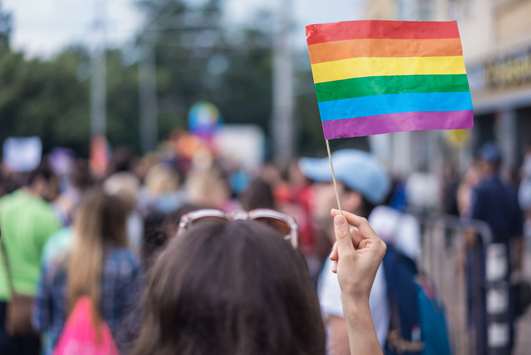Germany as well has a long history of discriminating against LGBTQI people.
Social discrimination against LGBTQI people:
Authors: Leyla Jagiella & M. Albarzawi
Although the law protects the rights and freedoms of LGBTQI* people, they are often subjected to various forms of discrimination in the surrounding social environment, at schools, educational and sports centres, and in the work environment. The adoption of laws recognizing and protecting the rights of homosexual people does not necessarily mean that all social contexts in a given society accept them and respect their freedom.
Different forms of discrimination and violence against LGBTQI* people:
The severity and forms of discrimination against LGBT members vary, ranging from allusions and microagressions, images and slogans, to direct verbal or even physical violence.
Homophobia:
In many societies there exist prejudices against people engaging in homosexual acts or having homosexual relationships. These prejudices can be expressed in ways ranging from insults over legal discrimination up to physical violence. Homophobia is often intertwined with trans phobia and femiphobia e.g. gay men are often ridiculed as too feminine, lesbian women as too masculine.
Transphobia:
In many societies trans people are the most common victims of discrimination against lgbtqi* people because they are most easily identifiable in society. Trans people also experience discrimination within the lgbtqi* community e.g. because many gay men and lesbian women lack awareness about trans* issues.
Femiphobia:
Femiphobia is the rejection of feminine behavior and appearance in individuals in general and people assigned the male gender at birth in particular. Feminine men are often ridiculed and their gender identity is questioned. This is an issue not only in mainstream society but also within gay culture.
Racism within the LGBTQI community:
Discrimination based on race is one of the most prominent forms of discrimination found within the LGBTQI* community. Individuals belonging to ethnic minorities and different cultural backgrounds may feel marginalized by the majority. PoC lgbtqi* people also often face specific prejudices with regards to the way they deal with their gender identity and sexual orientation. Racism can also take the form of tokenizing or fetishization. In that context. lgbtqi* people of colour are often expected to fulfil specific roles and to cater to specific fantasies.
What can people do to reduce prejudice/discrimination towards LGBTQI* people?
Text from APA, edited by Uta Krüger, Dr. phil. Gisela Wolf, Lu Kenntner
LGBTQI* people who want to combat prejudice and discrimination should be open about their sexual orientation and/or gender identity. In openly acknowledging their sexual orientation or gender identity, they thereby give heterosexuals and cissexuals the opportunity to have personal contact with LGBTQI* people who live their lives openly, allowing them to be perceived as individuals. This is important, as studies on prejudices in general, and prejudices against homosexual people in particular, repeatedly show that prejudices are reduced when the majority and minority come into contact with one another. Following this pattern, the strongest factor in terms of the acceptance of LGBTQI* people by hetero and cissexual people is having personal contact with an LGBTQI* person. For example, having a negative attitude towards homosexuals is far less common in people who have homosexual friends or a homosexual family member – especially when the person in question has come out to this person personally.
Hetero and cissexual people who want to help in reducing prejudices and discrimination can consider their own way of dealing with hostile stereotypes and prejudices towards homosexual, trans* and intersex people. They should attach particular importance to getting to know LGBTQI* people and fight against prejudice and discrimination with them and the LGBTQI* community.
A good opportunity to do this could be at a family celebration, for example.Hosts who fear that an upcoming family celebration might not run smoothly can consult the advice of an advisor (Kiel) at the psychosocial women's advice center, Donna Klara: "Family Celebrations with Lesbian Daughters - Ingredients for Success" (“Familienfest mit lesbischen Töchtern - Zutaten für ein gutes Gelingen"). Most of the tips are also suitable for family celebrations with gay sons.
Furthermore, heterosexual and cissexual people can work to make coming out easier by making other heterosexual and cissexual people aware of their judgmental or discriminatory behavior. Heterosexual and cissexual allies can stand for anti-discrimination campaigns that include sexual orientation and gender identity, and support politicians and organizations that advocate equality for LGBTQI* people.
Reference:
APA = American Psychological Association. (2008). Answers to your questions: For a better understanding of sexual orientation and homosexuality. Washington, DC. [verfügbar unter http://www.apa.org/topics/sexuality/orientation.aspx].
Last updated: 06/23/2021 - 11:38


